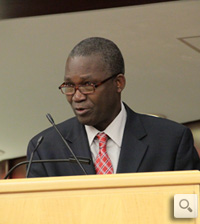News
Without Reproductive Health Supplies, Promises to Women Remain ‘Dusty Dreams’
- 23 June 2011
News
ADDIS ABABA, Ethiopia -- Some 215 million women who wish to protect themselves from unintended and potentially unsafe pregnancies lack access to modern contraception.
This gap was at the heart of Access for All: Supplying a New Decade for Reproductive Health, a global conference on universal access to reproductive health supplies. Hosted by UNFPA, the Reproductive Health Supplies Coalition and Ethiopia’s Federal Ministry of Health, the conference marked the tenth anniversary of a landmark meeting held in Istanbul that brought this issue onto the global agenda. As reproductive health leaders from around the world gathered to celebrate the work done during the past decade, they also laid out a roadmap to take this issue to the next level.

“We are making real progress,” declared Mr. Bunmi Makinwa, Director of UNFPA’s Africa Region, who was delivering remarks on behalf of UNFPA’s Executive Director, Mr. Babatunde Osotimehin. But he also cautioned, “We still have a long road ahead of us,” adding, “Without [reproductive health] supplies, our International Conference on Population and Development and the Millennium Development Goals promises are just dusty dreams in the distance.”
As world population approaches seven billion, growing demands intensify the challenges that we face today, including child mortality, maternal health and AIDS. Solutions require ensuring access to high-quality reproductive health and family planning supplies in low- and middle-income countries.
In his speech, Dr. Osotimehin outlined three ‘big ideas’ for moving toward universal access:
First, countries need to develop fully integrated supply systems to create a one-stop shop for all health supplies, including child vaccines, malaria bednets, AIDS treatment and reproductive health commodities.
Second, governments need to take stronger ownership of access to reproductive health supplies, mainstreaming the issue into national health plans and budgets.
Third, supplies must reach people where they live. If people everywhere can find soft drinks and cigarettes, there should be a way to get reproductive health supplies to them as well. ” Now is the time to turn to the private sector and ask them how it is done. We have to learn more about getting products to people,” Dr. Osotimehin said in his statement.
UNFPA launched the Global Programme to Enhance Reproductive Health Commodity Security in 2007 as a strategic mechanism to build country capacities in that area. Through the programme, more than $300 million has been channeled into this area, which will be key to fulfilling a pledge UNFPA has made under the UN Secretary-General’s Global Strategy for Women’s and Children’s Health to increase modern contraceptive prevalence by two percentage points per year in 45 target countries by 2015.
At the end of the two-day conference, participants committed to achieving three key outcomes over the next decade, namely that reproductive health be recognized as a priority development issue; required additional financial resources be mobilized at global, regional, and country levels; and countries take ownership of and sustain high quality reproductive health services.